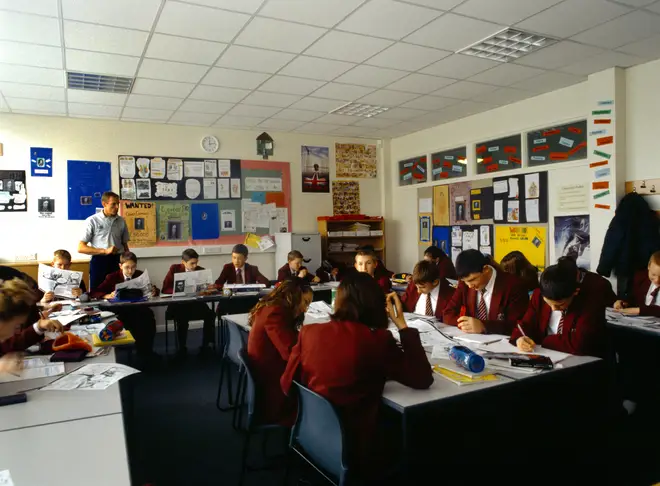
Clive Bull 1am - 4am
21 October 2021, 20:31 | Updated: 21 October 2021, 20:54

Schools should not teach contested views about "white privilege" as fact, the Government has said, after a report branded such terms "divisive" and said they may cause white working-class pupils to be "neglected".
The Department for Education (DfE) said it is planning to develop new guidance to help schools "meet their duties" while teaching about complex political issues, in its response to the report from the Education Select Committee.
The report from the Conservative-dominated committee suggested that white working-class pupils have been "let down" for decades by England's education system - and "divisive" language can make the situation worse.
The report said schools should consider whether the promotion of such "politically controversial" terminology is consistent with their duties under the Equality Act 2010.

'We should do all of the educating in school, not on the statue.'
The report was heavily criticised after it was published in June, with Tory MPs accused of trying to stoke a "culture war".
Critics also said it was the Conservative Government, rather than terms such as white privilege, which had failed poorer children.
Read more: No10 dismisses 'Plan C' and denies plans for ban on Christmas household mixing
Read more: Raab: Bring in prisoners to solve HGV driver shortage, not 'cheap' foreign workers
But it its response, published on Thursday, the Government said schools must take steps to ensure political issues were taught in a "balanced" way.
It added: "Schools should not teach contested theories and opinions as fact, and this includes contested views about 'white privilege'.
"Political issues relating to racial and social justice can be taught about in a balanced and factual manner, just as pupils are often taught about a range of different views on other topics."
The Government said these were "important principles to uphold" and said it was working with the sector to "develop guidance which will help schools understand and meet their duties in this area".

Furious mum argues with eco-mob on school run
The Government's response to the report has been criticised by education chiefs.
Natalie Arnett, senior equalities officer at school leaders' union NAHT, said the response was "unhelpful" and that the Government needed to trust the schools themselves to make decisions about what to teach students.
"We need to trust schools to have the conversations with pupils that are right for their contexts and communities," said Ms Arnett.
"Simplistic diktats like this from central government are unhelpful."
Read more: Get your vaccine to keep Britain on track, PM pleads as he sticks to Plan A
Read more: MPs' fury as 'Festival of Brexit' rebranded with no mention of leaving the EU
Julie McCulloch, director of policy at the Association of School and College Leaders (ASCL), also said the guidance was "unhelpful", saying that schools were aware of how to teach political issues in schools and were already conscious of the need to give a balanced picture.
"Schools and colleges are very experienced at teaching controversial and challenging subject matter and helping young people to understand complex issues," she said.
"Part of this is exploring issues from different viewpoints."
She added: "The legal requirement for teachers to remain politically impartial is clear and well understood.
"We are not convinced that further Government guidance in this area is either necessary or helpful."